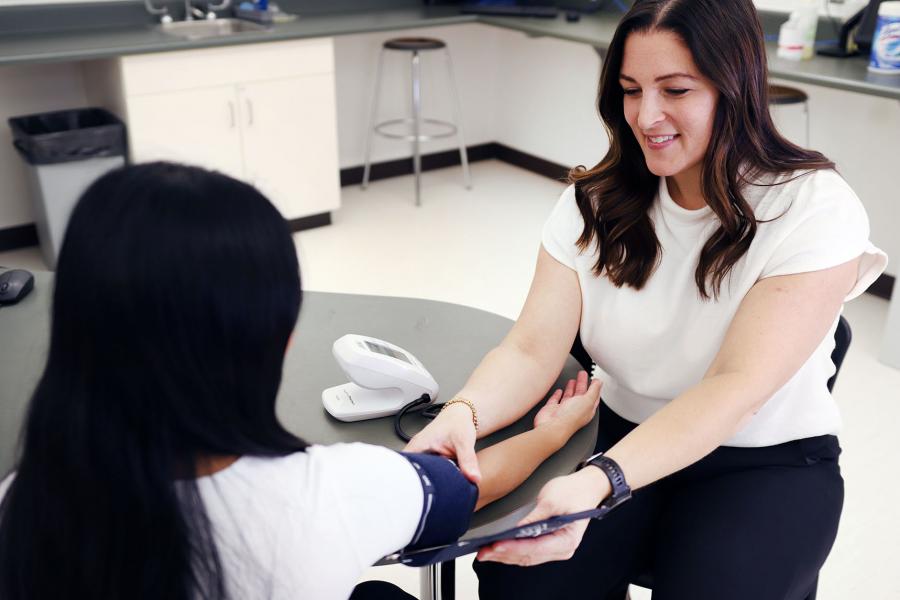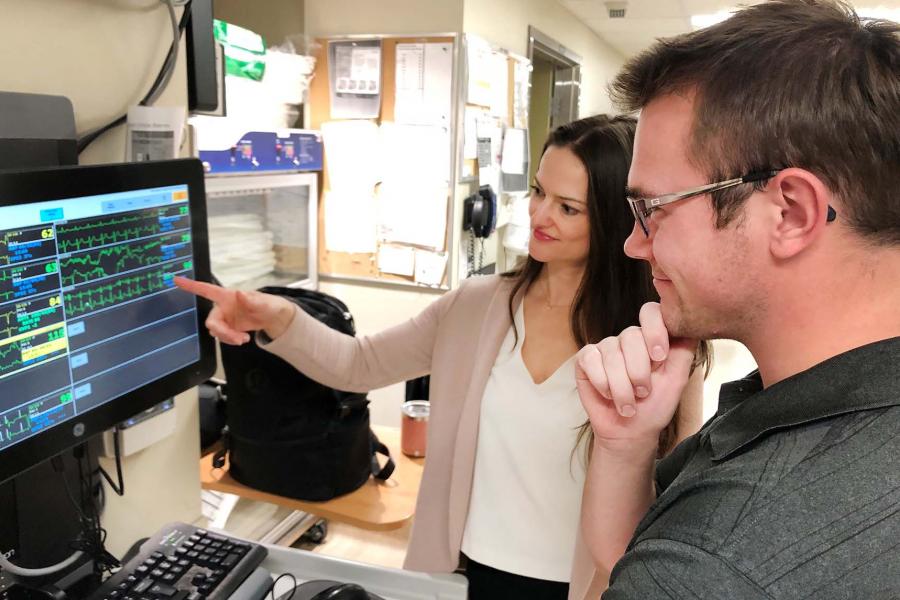
We are now accepting applications
Study with us
Program details
This micro-certificate program is designed for practicing pharmacists seeking to strengthen their clinical expertise and practical skills. With a focus on real-world application across diverse pharmacy settings, the program equips participants to provide high-quality, evidence-based care. Upon completion, participants will be better prepared to meet the increasing complexity of patient needs and deliver impactful, up-to-date pharmaceutical care.
Expected duration: 1 year
Required contact hours: 36
Flexibility
This micro-certificate is designed to accommodate the schedules of working professionals. Each course within the program is available online, featuring both asynchronous activities (allowing participants to work at their own pace) and synchronous evening classes (facilitating discussions with peers and instructors through video conferencing). Weekly commitments entail a minimum of two hours of asynchronous work alongside a one-hour synchronous session. The program has been designed to be completed in 1 year.
Accredited learning
You can log this continuing education opportunity as accredited learning in your Professional Development Log. Each contact hour corresponds to one Continuing Education Unit (CEU), following the guidelines established by the College of Pharmacists of Manitoba (CPhM). If you're applying from a different province, please check with your respective provincial regulatory body for their specific continuing education requirements.
Scheduling
| Course code | Course title | Class length | Start date | Online synchronous sessions |
|---|---|---|---|---|
| PHMD 0100 | Scientific Literature Evaluation | 3 weeks | Sept. 10, 2025 | Sept. 17, Sept. 24, and Oct. 1, 2025 (7:00–8:00 PM) |
| PHMD 0110 | Patient Assessment | 3 weeks | Oct. 22, 2025 | Oct. 29, Nov. 5, and Nov. 12, 2025 (7:00–8:00 PM) |
| PHMD 0120 | Advanced Clinical Topics | 6 weeks | Jan. 14, 2026 | Jan. 21, Jan. 28, Feb. 4, Feb. 18, Feb. 25, and Mar. 4, 2026 (7:00–8:00 PM) |
Program descriptions
PHMD 0100 – Scientific Literature Evaluation
Course overview
This course is designed to enhance your understanding and application of research methods, study designs, and medical statistics in pharmacy practice. You will learn to evaluate scientific literature critically and apply its findings to patient care, facilitating evidence-based medicine. Additionally, you will develop skills to effectively communicate scientific information to both healthcare professionals and patients.
Weekly breakdown
Week 1: Study designs and medical statistics
- Topics covered:
- Compare and contrast various study designs, identifying their strengths and weaknesses.
- Compute, describe, and interpret basic medical statistics.
Week 2: Evaluating medical literature
- Topics covered:
- Critique and evaluate medical literature systematically.
Week 3: Applying and communicating literature findings
- Topics covered:
- Summarize pertinent findings from literature evaluation clearly and concisely.
- Support clinical decision-making using relevant literature findings.
- Communicate relevant scientific literature effectively.
Assessment
- Format: Take-home assignment
- Duration: One week to complete
- Due date: October 8, 2025
Contact hours
- 9 contact hours
PHMD 0110 – Patient Assessment
Course overview
This course is designed to equip you with the skills to identify and resolve patient medication-related needs using systematic approaches. You will learn to gather information through comprehensive patient interviews and basic physical assessments. The course will deepen your understanding of your role in patient assessment and how it informs the selection, efficacy, tolerability, and monitoring of pharmacotherapy options. You will also learn to interpret and describe physical assessment findings that are crucial for clinical decision-making and formulating patient-centered recommendations.
Weekly breakdown
Week 1: Introduction to patient assessment and pharmacist’s role
- Topics covered:
- Introduction to patient assessment techniques.
- Understanding the pharmacist's role in patient assessment.
Week 2: Cardiology and fluid assessment
- Topics covered:
- Fluid assessment and EKG interpretation.
- Evaluation of myocardial ischemia with a focus on diagnostic imaging relevant to pharmacy practice.
Week 3: A systematic approach to infectious disease
- Topics covered:
- A systematic approach for assessing patients with infectious diseases—designed to enhance clinical decision-making in pharmacy practice.
Assessment
- Format: Take-home assignment
- Duration: One week to complete
- Due date: November 19, 2025
Contact hours
- 9 contact hours
PHMD 0120 – Advanced Clinical Topics
Course overview
This course is designed to enhance your ability to identify, prioritize, and address patient medication-related needs through practical and realistic patient scenarios. You will develop critical thinking and problem-solving skills to provide pharmaceutical care to increasingly complex patients. The course emphasizes assessing and evaluating the best available medical literature to support your recommendations. By the end of the course, you will be prepared to confidently tackle the challenges of complex patient cases.
Weekly breakdown
Week 1: Updates in cardiology
- Topics covered:
- Latest advancements and treatment strategies in cardiology.
Week 2: Diabetes and chronic kidney disease
- Topics covered:
- Management of diabetes in chronic kidney disease patients, with emphasis on the latest pharmacotherapy advancements.
Week 3: Infectious disease (and pediatrics)
- Topics covered:
- Systematic approach to infectious diseases.
- Special considerations for pediatric patients.
Assessment
- Format: Take-home assignment
- Duration: One week to complete
- Due date: February 11, 2026
Week 4: Opioid stewardship
- Topics covered:
- Best practices for managing opioid use and preventing misuse.
Week 5: Depression
- Topics covered:
- Review diagnostic criteria for major depressive disorder.
- Review pharmacological and non-pharmacological alternatives to treat depression.
Week 6: Medication optimization in the older adult
- Topics covered:
- Strategies for optimizing medication use in older adults.
Assessment
- Format: Take-home assignment
- Duration: One week to complete
- Due date: March 11, 2026
Assessment strategy
The overall program will be assessed using a pass/fail system based on the completion and quality of the take-home assignments.
Contact hours
- 18 contact hours
Our instructors
| Name | Credentials | Workplace |
|---|---|---|
| Rob Ariano | PharmD, BCPS, FCCM | St. Boniface Hospital |
| Jennifer Gibson | BSP, ACPR, EPPh | Winnipeg Regional Health Authority |
| Ruchi Kumra | BSP, PharmD, MSc (QIPS) | College of Pharmacy, University of Manitoba and St. Boniface Hospital |
| Cody Magnusson | BScPharm, PharmD, EPPh (Internal Medicine) | Johnson Memorial Hospital, Interlake Eastern Regional Health Authority |
| Derek McCreath | BScPharm, ACPR, EPPh | Children’s Hospital, Manitoba |
| Rick Thurmeier | BScChem, BScPharm | Consultant to Anxiety Disorders Association of Manitoba (ADAM) |
| Dana Turcotte | BScPharm, PhD | College of Pharmacy, University of Manitoba and ACCESS River East |
| Travis Warner | BSP, ACPR, BCPS, EPPh | St. Boniface Hospital |
Student testimonials
“It’s been a truly valuable, challenging experience that has enriched my practice and perspective as a pharmacist clinician.”
—Judy
“The course delivery was easy to integrate into my busy life, and the material was interesting. I learned a lot and got excited about the practice of pharmacy again.”
—Jessica
“The format of the Micro Certificate Program is great for busy professionals. It was very manageable as a full-time pharmacist, and I found the topics and speakers extremely relevant and impactful for enhancing my pharmacy practice. I would highly recommend it to colleagues to refresh their knowledge and learn current best practice in a variety of clinical areas!”
—Katie
Admission requirements
Applicants must have a Bachelor of Science in Pharmacy (BSc Pharm) or a Doctor of Pharmacy degree (PharmD) and have a license to practice pharmacy. The application is open to pharmacists across Canada. All applicants must meet the English language proficiency requirements.
Students for the program will be accepted on a first-come, first-served basis.
Fees: $1,000 tuition (due upon course registration) plus a $100 non-refundable application fee.
How to apply
Domestic student application fee: $100
Applications for micro credentials at the University of Manitoba are completed online. To begin your application, select the "Start or continue your application" button.
The online application includes several parts, and you may be required to submit proof of age, proof of English Language proficiency and other documents.
| Start Date | Applications open | Application deadline |
|---|---|---|
| September | May 20, 2025 | August 15, 2025 |
Applicants must submit their online application with supporting documentation and application fee by the deadline date indicated.
Learn more
Contact us
Admission and application inquiries
Mailing address
Undergraduate Admissions
424 UMSU University Centre
University of Manitoba
66 Chancellors Circle
Winnipeg, MB R3T 2N2 Canada
Office location
Room 424 UMSU University Centre
65 Chancellors Circle
University of Manitoba (Fort Garry campus)
Submit a question
Phone: 204-474-8808
Toll-free: 1-800-224-7713 ext 8808
Microcertificate program inquiries
College of Pharmacy
Apotex Centre
750 McDermot Avenue West
University of Manitoba (Bannatyne campus)
Winnipeg, MB R3E 0T5 Canada
Phone: 204-474-9306
Email: PharmacyPD@umanitoba.ca
College of Pharmacy
Apotex Centre
750 McDermot Avenue West
University of Manitoba (Bannatyne campus)
Winnipeg, MB R3E 0T5 Canada















